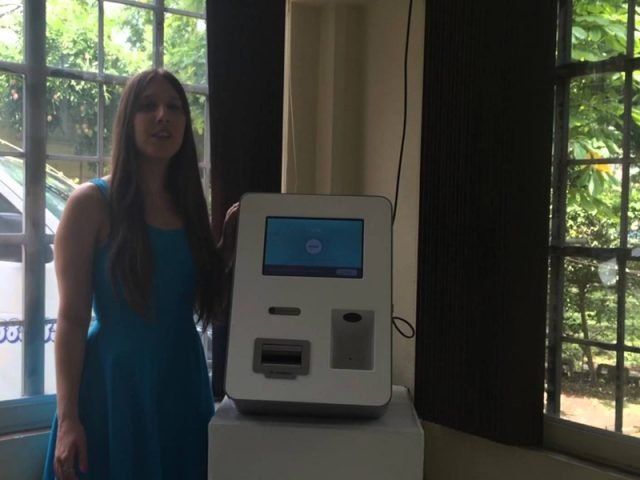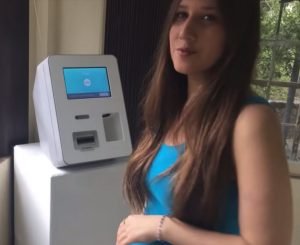Cryptocurrencies are rapidly growing in popularity throughout Latin America. So, Bitcoin.com decided to get an insider’s view on Bitcoin adoption in the region by speaking with Cindy Zimmerman, CEO ofTigoCTM (Crypto Teller Machine), based in Panama

Zimmerman is a Bitcoin ATM owner and operator as well as a computer scientist. She tells us how she got involved with cryptocurrency and how her crypto teller machine service grew from a passive income into an entrepreneurial business operation. Her Bitcoin teller machine has been quite popular in the Panama region, and the device will soon be integrating the privacy-centric cryptocurrency Dash.
Many Latin Americans have experienced massive flaws in their fiat currency and are in many ways more receptive to the idea of using cryptocurrencies.
Zimmerman’s CTM Helps People in Latin America
Bitcoin.com (BC): How did you first get introduced to cryptocurrencies?
Cindy Zimmerman (CZ): I was first introduced to Bitcoin in 2012 by my brother. I had heard about Bitcoin earlier but did not think it was real until my brother had mentioned it and showed me its advantages over traditional financial systems. I became obsessed with the concept of cryptocurrencies almost immediately after.
BC: How is Bitcoin doing in Latin America from your point of view?
CZ: Bitcoin is gaining traction in Latin America, although it does vary country by country. Many Latin Americans have experienced massive flaws in their fiat currency and are in many ways more receptive to the idea of using cryptocurrencies. When a person loses faith in their currency but still needs to buy basic goods and services they normally turn to other forms of money. The US dollar has historically been a safe haven for some of these people, but there are times when the US dollar is less attainable, and that’s when cryptocurrencies tend to really shine.
BC: Can you tell our readers how and why you started the ATM service in Panama?
CZ: TigoCTM was born out of a solution to a cash problem I was having while living as an expat in Panama. At the time I was working for Coinapult, which is located in Panama but does business internationally. I was getting paid in bitcoin so that I could accommodate my expenses in both the US and Panama. At the time, there were very few ways to buy/sell Bitcoin in Panama and virtually no way to buy/sell Dash locally. I figured that the safest way for me to sell my bitcoins for cash was to buy a machine. This, in turn, gave people a safe and reliable way to buy Bitcoins without relying on someone else’s time schedule.
Venezuelans find that using CTMs are a faster and cheaper option than going through traditional banking or remittance methods.
BC: Have you guys seen a lot of users turning to cryptocurrency since starting your Crypto Teller Machine operations?
CZ: The response to opening a CTM operation has been interesting. Although Latin Americans in general respond positively towards cryptocurrencies there are some people that have gravitated more towards them than others. Our current largest customer base is Venezuelans. ManyVenezuelans have left in search of a far better economic situation. Some have family back in Venezuela who are still suffering. TigoCTM has helped people send money back to their families so they can afford basic food and medicine. Venezuelans find that using CTMs are a faster and cheaper option than going through traditional banking or remittance methods.
BC: Why did your company decide to add Dash to the Crypto Teller Machine?
CZ: Dash is a natural cryptocurrency for CTMs. Dash’s transactions are instant, which makes it better for CTMs than Bitcoin. There are times when a customer goes to the CTM and panics because their Bitcoins do not show up right away. This is usually when I get called to explain that their wallet is asking for a certain number of confirmations. Many times for these Bitcoin users I have to show them the transactions on a blockchain explorer. Dash has resolved this problem in a very eloquent way.
BC: Do you think Dash’s privacy advantages will be useful to citizens in Latin America?
CZ: Personally I think that Dash’s privacy advantages are useful to everyone. However, in my experience in the crypto world privacy is not usually the first thing that people think about when using currencies. Privacy tends to be an afterthought if any at all. The first thing that comes to the average person’s mind when dealing with currency is what they are able to buy. At the moment, Bitcoin is accepted in more places and therefore is more popular. However, Dash has some characteristics that could be advantageous for a use case like a remittance. It has instant transactions and a relatively stable price for a cryptocurrency. Additionally, Dash masternodes pay dividends for people who are lacking other bank services, such as interest-bearing savings accounts, safe from seizure.
Cryptocurrencies are easier to send internationally than fiat and fiat is easier to send than Gold or Silver. This is the ultimate attraction cryptocurrencies have for people migrating.
BC: Have you seen first-hand the civil unrest taking place in certain Latin American economies such as Venezuela?
CZ: I have not seen first-hand the civil unrest taking place in certain places in Latin America, just the aftermath. I have heard numerous stories from countless Venezuelan immigrants living in Panama. There also seems to be a new wave of immigrants coming from Cuba and Brazil with their own stories. Panama is much more stable in comparison to these countries.
BC: Why do you think people are looking to cryptocurrencies now as opposed to Gold and Silver safe havens?
CZ: Today’s economic situation is global. There are people turning to Gold and Silver as safe havens. However, Gold and Silver are not ideal for international trade; they are more ideal for preserving wealth. If you want to preserve a portion of your wealth for future spending, Gold and Silver are very appropriate. However, if you want to send money internationally to family overseas, it is very difficult to send physical Gold and Silver and very easy to send cryptocurrencies. Cryptocurrencies are easier to send internationally than fiat, and fiat is easier to send than Gold or Silver. This is the ultimate attraction cryptocurrencies have for people migrating.
BC: When do you guys plan to deploy more machines to your network in Latin America?
CZ: At the moment we have bought five more machines we are planning on deploying. We are contemplating a couple of locations here in Panama, and I have received several inquiries about Venezuela. The rest of the locations are actually not in Latin America, we have received a few inquiries in the US, Canada, and some African countries. Hopefully, we can deploy these in the next six months and then begin working on our next batch.
BC: Can you tell our readers the overall mission behind TigoCTM?
CZ: TigoCTM’s mission is to provide easy access to cryptocurrencies in places where people need them the most

I am a downvote bot. Contact @pharesim at slack if you think I am misbehaving. Please help fighting spam! Upvote this post to strengthen the bot, downvote the parent post if it has positive upvotes.